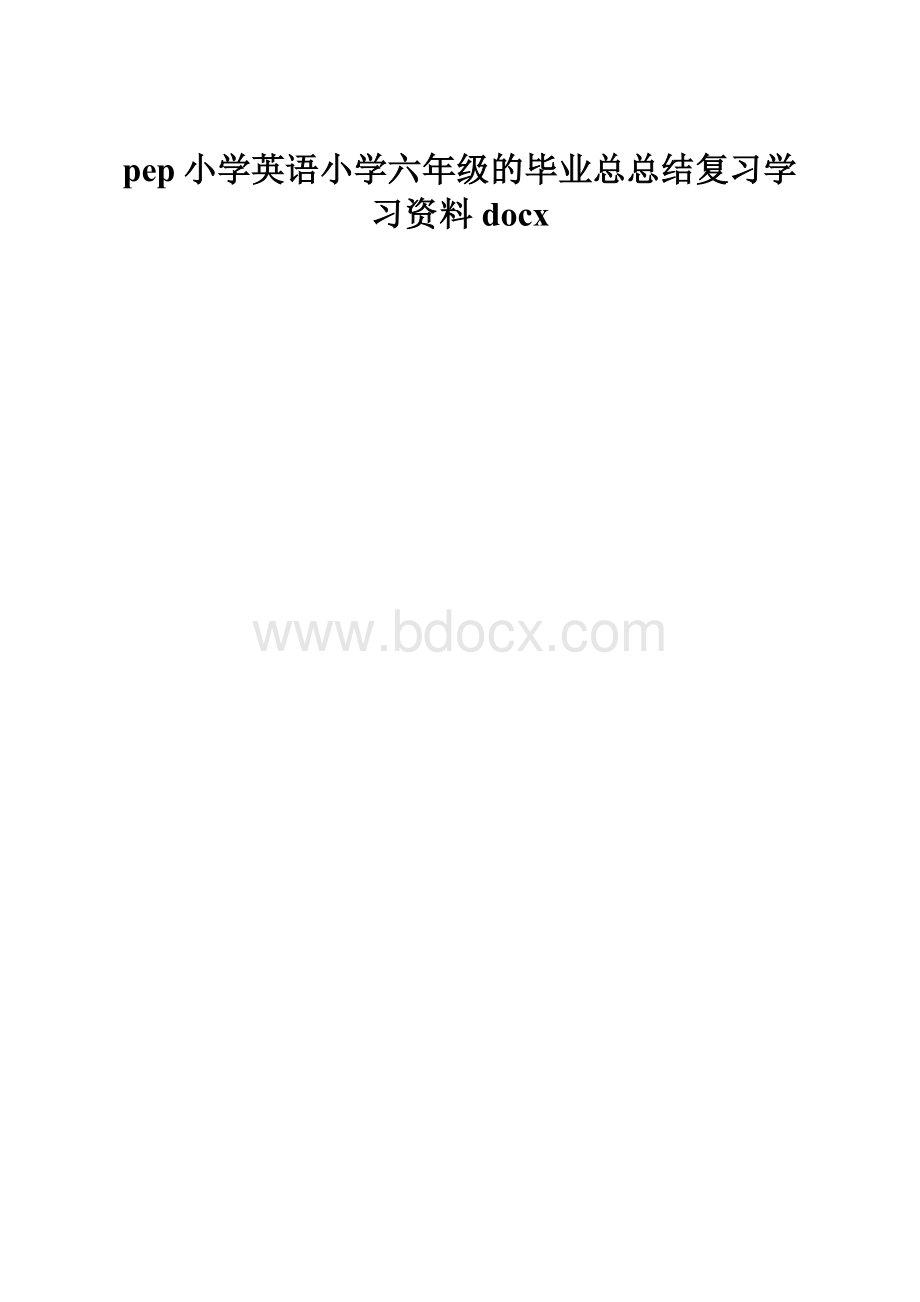pep小学英语小学六年级的毕业总总结复习学习资料docx.docx
《pep小学英语小学六年级的毕业总总结复习学习资料docx.docx》由会员分享,可在线阅读,更多相关《pep小学英语小学六年级的毕业总总结复习学习资料docx.docx(31页珍藏版)》请在冰豆网上搜索。

pep小学英语小学六年级的毕业总总结复习学习资料docx
PEP小学英语毕业总复习
一:
易错词汇
1.a,an的选择:
元音音素开头的单词用an,如:
anant/egg/ice-cream/orange/umbrella辅音音素开头的单词用a.
2.am,is,are的选择:
单数用is,复数用are,I用am,you用are.
3.
have,has
的选择:
表示某人有某物。
单数用
has,复数用have,I\you
用have.
I/you/we
havemanybooks.
He/Shehasmanybooks.
4.
thereis,thereare的选择:
表示某地有某物或某人。
单数用
thereis,复数用thereare.
Thereisa
bedinthebedroom.
Therearesome/manybooksonthedesk.
Arethereany
booksonthedesk?
5.
some,any
的选择:
肯定句用some,疑问句和否定句用
any.
6.疑问词的选择:
what(什么)who(谁)where(哪里)why(为什么)when(什么时候)how(如何)
which(哪一个)howold(多大)howmany(多少)howmuch(多少钱/多少)whose(谁的)
二:
形容词比较级详解
比较级的句子结构通常是:
主语+be动词(am,is,are)+形容词比较级+than(比)+比较对象,如:
I’mtallerandheavierthanyou.(我比你更高和更重。
)
Anelephantisbiggerthanatiger.(一只大象比一只老虎更大。
)
形容词的比较级是在形容词的基础上变化而来的,它的变化规则是:
①一般的直接在词尾加er,如tall-taller,strong-stronger,
②以e结尾的,直接加r,如fine–finer,
③以辅音字母加y结尾的,先改y为i再加er,如funny-funnierheavy--heavier
④双写最后的字母再加er,如big–bigger,thin–thinner,hot–hotter
☆注意☆比较的两者应该是互相对应的可比较的东西。
典型错误:
Myhairislongerthanyou.(我的头发比你更长。
)比较的两者是我的头发、你(整个人),那么比较的对象就没有可比性。
应该改为:
Myhairislongerthanyours.或Myhairislongerthanyourhair.(yours=yourhair)
三:
动词过去式详解动词的过去式的构成规则有:
第1页共8页
A、规则动词
①一般直接在动词的后面加ed:
如worked,learned,cleaned,visited
②以e结尾的动词直接加d:
如lived,danced,used,tasted,
③以辅音字母加y结尾的动词要改y为i再加ed(此类动词较少)如study–studiedcarry–carried
worry–worried(注意play、stay不是辅音字母加y,所以不属于此类)
④双写最后一个字母(此类动词较少)如stopped
B、不规则动词(此类词并无规则,须熟记)小学阶段要记住以下动词的原形和过去式:
sing–sang,eat–ate,see–saw,have–had,do–did,go–went,take–took,buy–bought,get–got,read–read,fly–flew,swim–swam,am/is–was,are–were,
make-made,win-won,say–said,leave–left,tell–told,draw–drew,come–
came,hurt–hurt,run-ran,lose-lost,drink-drank,find-found
重要句型:
Wheredidyougoonyourholiday?
Iwentto?
Whatdidyoudothere?
I+动词过去式.
Howdidyougothere?
Iwent(there)by/on?
.
Whendidyougothere?
Iwentyesterday/last?
(表示过去的时间)
Whodidyougowith?
Iwentwith+人物.
Didyouhaveagoodtime?
Yes,Idid./No,Ididn’t.
四:
动词现在分词:
动词的ing形式的构成规则:
①一般的直接在后面加上ing,如doing,going,working,singing,eating
④以e结尾的动词,要先去e再加ing,如having,writing,taking
⑤双写最后一个字母的(此类动词极少)有:
running,swimming,sitting,getting
五:
一般将来时态(begoingto/will+动词原形)
表示一般将来时的时间状语有:
thismorning,thisafternoon,thisevening,tomorrow,tonight,thisweekend,
nextweek,nextmonth,nextyear,nextweekend.
你将要去哪里?
Whereareyougoingthisweekend?
I’mgoingtothebookstore.
你将要做什么?
Whatareyougoingtodo?
I’mgoingtobuyabook.
你将什么时候去?
Whenareyougoing?
I’mgoinginthemorning..
你将怎样去呢?
Howareyougoing?
I’mgoingbybus.
你将和谁一起去?
Whoareyougoingwith?
I’mgoingwithmyfriend.
第2页共8页
IwatchedTVyesterdayevening.
六:
第三人称单数
第三人称单数动词的变化:
1.一般情况加s,如:
read—reads;live—lives;play—plays;sing—sings
2.动词末尾以s,x,ch,sh或部分以o结尾的加es。
记住课本中出现的这几个:
(watches,teaches,
goes,does,washes,
passes)
3.辅音字母+y结尾的把y变i再加es,如:
fly—flies;study—studies
4.特殊情况:
have--has
5.第三人称单数主语包括:
he;she;it;myfather/friend;Amy/Hangzhou
等一个人名或地名。
例如:
Helikesdrawingpictures.
Sheworksinacarcompany.Itcomes
fromtheclouds.
Myfathergoestoworkonfoot.
Mikeoftenreadsbooksafterlunch.
6.一般疑问句:
does提前,动词还原。
DoessheteachEnglish?
DoesyourpenpalliveinHangzhou?
七、名词的复数形式.
一般直接加s:
hands,books,desks,apples...
以o结尾的加es的有:
tomatoes,potatoes其他加s:
zoos,photos,pianos..
以s、x、sh、ch结尾的名词加es:
glasses,boxes,classes,watches(手表)
以辅音字母+y结尾的名词,将y改变为i,再加-es:
baby-babies,city-cities,dictionary-dictionaries?
以f/fe结尾的,多将-f或-fe改变为-ves:
knife-knives,leaf-leaves,
不规则变:
man→menwoman→womenchild→childrenfoot→feettooth→teeth
goose→geesemouse→micepeople-peoplefish-fishsheep-sheep
八:
句型专项归类
1、肯定句:
是指用肯定的语气来陈述的句子,如:
I’mastudent.Sheisadoctor.
Therearefourfansinourclassroom.Hewilleatlunchat12:
00.
Heworksinahospital.
2、否定句:
含有否定词或表示否定意义词的句子,如:
I’mnotastudent.Sheisnot(isn’t)adoctor.
Hedoesnot(doesn’t)workinahospitalThere.arenot(aren’t)fourfansinourclassroom.
Hewillnot(won’t)eatlunchat12:
00.Ididnot(didn’t)watchTVyesterdayevening.
第3页共8页
☆注意☆小结:
否定句主要是在肯定句的基础上加上了否定词―not。
‖有动词be的句子则―not加‖在be后面,可缩
写成―isn,’taren’,t‖但amnot一般都分开写。
没有动词be
的句子则要先在主要动词的前面加上一个助动词(do,
does,did),然后在它后面加上―not,‖你也可以把它们缩写在一起如―don’t,doesn’t),didn。
这三个’助t动词要根
据人称和时态来选择,其中―does只‖用于一般现在时主语是第三人称单数的情况,而―did只‖用于一般过去时,不论
主语是什么人称和数,都用―did‖。
3、一般疑问句:
是指询问事实的句子,此类句子必须用
―yes,‖或―no来‖回答。
如:
Areyouastudent?
Yes,Iam/No,Im’not.Issheadoctor?
Yes,sheis./No,sheisn’t.
Doesheworkinahospital?
Yes,hedoes./No,hedoesn’t.
Aretherefourfansinourclassroom?
Yes,thereare./No,therearen’t.
Areyougoingtobuyacomicbooktonight?
Yes,Iam./No,Iamnot.(Yes,weare./No,wearen’t.)
Willheeatlunchat12:
00?
Yes,Iwill./No,Iwillnot(won’t).
Aretheyswimming?
Yes,theyare./No,theyaren’t.
DidyouwatchTVyesterdayevening?
Yes,Idid./No,Ididn’t.
☆注意☆小结:
一般疑问句是在肯定句的基础上,
①把动词be调到首位,其他照写,末尾标点符号变成问号即可。
②没有动词be的句子则要在句首加上一个助动词(do,does,did)再把紧跟在后面的动词变回原形,末尾标点符号变成问号即可。
―does只‖用于一般现在时主语是第三人称单数的情况,而
―did只‖
这三个助动词也要根据人称和时态来选择,其中
用
于一般过去时,不论主语是什么人称和数,都用
―did‖。
一般疑问句有个重要的原则就是问和答要一致,即问句里
的第一个单词(助动词)和简略答句里的这个词是一致的。
4、特殊疑问句:
以特殊疑问词(
what,where,who,which,when,whose,why,how
等)开头引导的句子。
此类句
子应该问什么就答什么,不能用
―yes、no‖来回答。
如:
Whatisthis?
It’sacomputer.
Whereareyougoing?
I’mgoingtoBeijing.
Whichseasondoyoulikebest?
Summer.
Whatdoeshedo?
He’sadoctor.
Whoplayedfootballwithyouyesterdayafternoon?
Mike.
Whendoyouusuallygetup?
Iusuallygetupat6:
30.
Whoseskirtisthis?
It’sAmy’s.Whydoyoulikespringbest?
Howareyou?
I’mfine./I’mhappy.HowdidyougotoXinjiang?
BecauseIcanplanttrees.
IwenttoXinjiangbytrain.
☆其中how又可以和其他一些形容词连用组成特殊疑问词组用来提问,如:
howmany(多少(数量)),howmuch
(多少(钱)),howtall(多高),howlong(多长),howbig(多大),howheavy(多重)
第4页共8页
☆小结:
howmany用来提问可数名词的数量,主要有以上三种句式搭配,
Howmany+
名词复数
+doyouhave?
你有多少?
?
?
Howmany+
名词复数
+canyousee?
你能看见多少
?
?
?
Howmany+
名词复数
+arethere?
?
有多少?
?
?
九:
人称和数
人称代词
物主代词
主格
宾格
第一
单数
I(我)
me
my(我的)
人称
复数
we(我们)
us
our(我们的)
第二
单数
you(你)
you
your(你的)
人称
复数
you(你们)
you
your(你们的)
he(他)
him
his(他的)
第三
单数
she(她)
her
her(她的)
it(它)
it
its(它的)
人称
their(他们的/
复数
they(他们/她们/它们)them
她们的/它们的)
七:
完全、缩略形式:
I’m=Iamhe’s=heisshe’s=sheisthey’re=theyareyou’re=youarethere’s=thereis
they’re=theyarecan’t=cannotdon’t=donotdoesn’t=doesnotisn’t=isnotaren’t=arenot
let’s=letuswon’t=willnotI’ll=Iwillwasn’t=wasnot
通常情况下,'m即am,'s即is(但let’s=let)us,'re即are,n't即not(但can’t=cannot)
八:
与字母相关的题型
(注:
五个元音字母是AaEeIiOoUu)
单词汇总
第5页共8页
学习用品(schoolthings):
pen钢笔pencil铅笔pencil-case铅笔盒ruler尺子book书bag包comicbook漫画书postcard明信片newspaper报纸schoolbag书包eraser橡皮crayon蜡笔sharpener卷笔刀
story-book故事书notebook笔记本Chinesebook语文书Englishbook英语书mathbook数学书magazine杂
志dictionary词典
人体(body):
foot脚head头face脸hair头发nose鼻子mouth嘴eye眼睛ear耳朵arm手臂hand手finger手指leg腿tail尾巴neck脖子
颜色(colours):
red红blue蓝yellow黄green绿white白black黑pink粉红purple紫orange橙brown棕
动物(animals):
cat猫
dog狗
pig猪duck鸭
rabbit兔horse
马elephant
大象
ant蚂蚁
fish鱼
bird
鸟
snake蛇
mouse老鼠
squirrel松鼠
kangaroo
袋鼠
monkey猴
panda熊猫
bear熊
lion
狮子
tiger老
fox狐狸
zebra斑马
deer鹿
giraffe
goose
hen母鸡
turkey火鸡
lamb小羊
sheep绵羊
goat
虎
长颈鹿
鹅
山羊
cow奶牛
donkey
驴
squid鱿鱼
lobster
龙虾
shark鲨鱼seal海豹spermwhale
抹香鲸killerwhale虎鲸
人物(people):
friend朋友
boy男孩
girl女孩
mother母亲
father
父亲
sister姐妹brother
兄弟
uncle叔
叔;舅舅
man男人
woman女人Mr.
先生
Miss小姐
lady
女士;小姐
mom妈妈
dad爸爸
parents父母
grandparents
祖父母
grandma/grandmother
(外)祖母
grandpa/grandfather
(外)祖父
aunt姑姑
cousin
堂(表)
兄弟;堂(表)姐妹
son儿子
daughter女儿
baby婴儿
kid
小孩classmate
同学
queen女王
visitor
参观者
neighbour邻居
principal校长
universitystudent
大学生
penpal笔友
tourist
旅行者
people人物
robot
机器人
teacher教师
student
学生
doctor
医生
nurse
护士
driver
司机
farmer
农民
singer
歌唱家
writer
职业(jobs):
作家
actor男演员
actress女演员
artist画家
TV
reporter
电视台记者
engineer工程师
accountant
会计
policeman(男)警察
salesperson
销售员
cleaner清洁工
baseballplayer棒球运动员
assistant售货员
police
警察
dancer舞者
食品、饮料(food&drink
):
rice米饭bread面包
beef牛肉
milk牛奶
water水egg
蛋
fish鱼
tofu豆
腐
cake蛋糕
hotdog热狗
hamburger
汉堡包
Frenchfries炸薯条
cookie
曲奇
biscuit饼干
jam果酱
noodles
面条
meat肉
chicken鸡肉
pork猪肉
mutton
羊肉
vegetable
蔬菜salad
沙拉